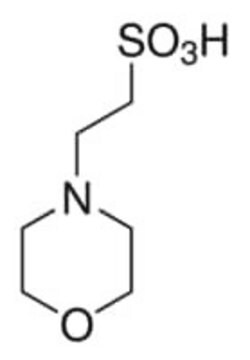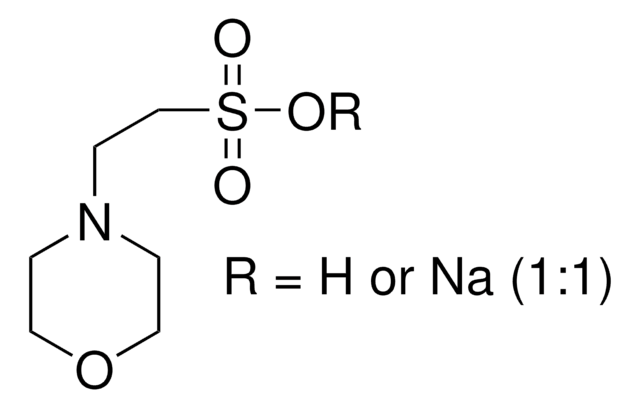69890
MES hydrate
BioUltra, ≥99.5% (T)
Synonym(s):
2-(N-Morpholino)ethanesulfonic acid hydrate, 4-Morpholineethanesulfonic acid
About This Item
Recommended Products
product line
BioUltra
Quality Level
assay
≥99.5% (T)
form
powder or crystals
impurities
insoluble matter, passes filter test
ign. residue (900°C)
≤0.05%
pH
2.5-4.0 (25 °C, 0.5 M in H2O)
useful pH range
5.5-6.7
pKa
6.1
solubility
H2O: 0.5 M at 20 °C, clear, colorless
anion traces
chloride (Cl-): ≤50 mg/kg
sulfate (SO42-): ≤100 mg/kg
cation traces
Al: ≤5 mg/kg
As: ≤0.1 mg/kg
Ba: ≤5 mg/kg
Bi: ≤5 mg/kg
Ca: ≤20 mg/kg
Cd: ≤5 mg/kg
Co: ≤5 mg/kg
Cr: ≤5 mg/kg
Cu: ≤5 mg/kg
Fe: ≤5 mg/kg
K: ≤50 mg/kg
Li: ≤5 mg/kg
Mg: ≤5 mg/kg
Mn: ≤5 mg/kg
Mo: ≤5 mg/kg
Na: ≤50 mg/kg
Ni: ≤5 mg/kg
Pb: ≤5 mg/kg
Sr: ≤5 mg/kg
Zn: ≤5 mg/kg
λ
0.5 M in H2O
UV absorption
λ: 260 nm Amax: 0.025
λ: 280 nm Amax: 0.020
SMILES string
O.OS(=O)(=O)CCN1CCOCC1
InChI
1S/C6H13NO4S.H2O/c8-12(9,10)6-3-7-1-4-11-5-2-7;/h1-6H2,(H,8,9,10);1H2
InChI key
MIIIXQJBDGSIKL-UHFFFAOYSA-N
Looking for similar products? Visit Product Comparison Guide
General description
Preparation Note
Other Notes
Sterilization: Sterilization should be by filteration through 0.2μM filters. Autoclaving is not recommended by any sulfonic acid buffers. If buffers must be nuclease-free, it is best to treat the water, then add the buffer solids after autoclaving. When MES solutions are autoclaved, they turn yellow (although pH does not change measurably. The identity of the yellow breakdown product is unknown.
Storage Class
13 - Non Combustible Solids
wgk_germany
WGK 1
flash_point_f
Not applicable
flash_point_c
Not applicable
ppe
Eyeshields, Gloves
Certificates of Analysis (COA)
Search for Certificates of Analysis (COA) by entering the products Lot/Batch Number. Lot and Batch Numbers can be found on a product’s label following the words ‘Lot’ or ‘Batch’.
Already Own This Product?
Find documentation for the products that you have recently purchased in the Document Library.
Customers Also Viewed
Our team of scientists has experience in all areas of research including Life Science, Material Science, Chemical Synthesis, Chromatography, Analytical and many others.
Contact Technical Service





